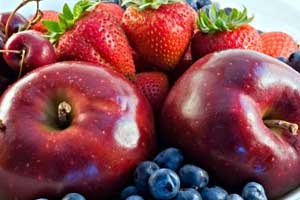- Home
- Editorial
- News
- Practice Guidelines
- Anesthesiology Guidelines
- Cancer Guidelines
- Cardiac Sciences Guidelines
- Critical Care Guidelines
- Dentistry Guidelines
- Dermatology Guidelines
- Diabetes and Endo Guidelines
- Diagnostics Guidelines
- ENT Guidelines
- Featured Practice Guidelines
- Gastroenterology Guidelines
- Geriatrics Guidelines
- Medicine Guidelines
- Nephrology Guidelines
- Neurosciences Guidelines
- Obs and Gynae Guidelines
- Ophthalmology Guidelines
- Orthopaedics Guidelines
- Paediatrics Guidelines
- Psychiatry Guidelines
- Pulmonology Guidelines
- Radiology Guidelines
- Surgery Guidelines
- Urology Guidelines
Flavonoid-rich foods lower mortality in high risk patients

Australia: Intake of moderate to high flavonoids and certain flavonoid subclasses may offer some health benefits, especially in people with at least one early mortality risk factor (eg, no regular exercise, obesity, high alcohol consumption, or smoking), according to a new study.
The study, published in the journal Clinical Nutrition further found that specifically, consumption of apple, tea and individual flavonoid compounds epicatechin and quercetin, were linked to a lower risk of all-cause mortality among participants having at least one risk factor, but not among others.
Nicola P. Bondonno, University of Western Australia, Royal Perth Hospital, Perth, Australia, and colleagues conducted the study to explore the associations of flavonoid and flavonoid-rich wholefood intakes with all-cause mortality and the moderating effects of early mortality risk factors.
The Blue Mountains Eye Study included 2,349 participants. Using US Department of Agriculture food composition databases, they calculated flavonoid intake from baseline food frequency questionnaires, and they used adjusted Cox proportional hazards models to analyze associations.
Key Findings:
- There was a flavonoid threshold effect with the greatest risk reduction seen between low and moderate intakes of total flavonoids, flavonoid classes, and flavonoid-rich foods.
- Amongst the whole cohort, participants in the highest tertile of anthocyanidin intake had a significantly lower risk of all-cause mortality when compared to those in the lowest tertile.
- Amongst participants with at least one early mortality risk factor (smoking, high alcohol consumption, no regular exercise or obesity), risk of all-cause mortality was lower in those in the highest intake tertile for total flavonoids, anthocyanidins, and proanthocyanidins, compared to those in the lowest tertile.
- No similar associations were observed among those without any risk factors. Similarly, consumption of apples, tea and the individual flavonoid compounds, quercetin, and epicatechin were associated with a lower risk of all-cause mortality among participants with at least one risk factor, but not amongst other participants.
"Based on the results, we found that moderate to high intakes of flavonoids and certain flavonoid subclasses may provide health benefits, particularly for individuals with at least one early mortality risk factor," concluded the authors.
For further reference log on to https://doi.org/10.1016/j.clnu.2019.01.004

Disclaimer: This site is primarily intended for healthcare professionals. Any content/information on this website does not replace the advice of medical and/or health professionals and should not be construed as medical/diagnostic advice/endorsement or prescription. Use of this site is subject to our terms of use, privacy policy, advertisement policy. © 2020 Minerva Medical Treatment Pvt Ltd